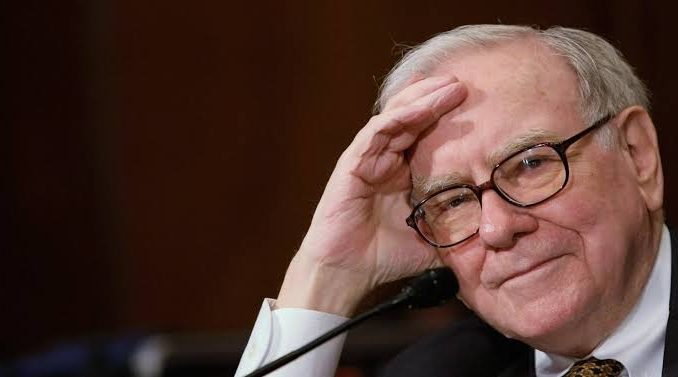
Warren Buffet now boasts of piling up a record $137 billion cash after his company, Berkshire, loaded up on stocks in part because of its inability to find large companies to buy outright, a drought that has lasted more than four years.
Berkshire Hathaway’s first-quarter earnings revealed that its Chairman and CEO Warren Buffett built up the conglomerate’s cash fortress and only bought small portions of stock during the violent rout of equity markets due to the coronavirus.
Now, Berkshire had a record $137 billion in cash and equivalent instruments on its balance sheet at the end of the first quarter, up from about $127 billion at the end of the year, a 10-Q filing showed, according to CNBC report.
However, the AFP said Buffett’s company reported a nearly $50 billion loss on Saturday because of a huge drop in the paper value of its investments, though it is still sitting on a big pile of cash.
Berkshire Hathaway Inc. said it lost $49.7 billion, or $30,653 per Class A share, during the first quarter. That’s down from last year’s profit of $21.66 billion, or $13,209 per Class A share.
The biggest factor in the loss was a $54.5 billion loss on the value of Berkshire’s investment portfolio as the stock market declined sharply after the coronavirus outbreak began. The year before, Berkshire’s investments added $15.5 billion to the company’s profits.
Buffett has long said Berkshire’s operating earnings offer a better view of quarterly performance because they exclude investments and derivatives, which can vary widely. By that measure, Berkshire’s operating earnings improved to $5.87 billion, or $3,617.62 per Class A share, from $5.56 billion, or $3,387.56 per Class A share.
Analysts surveyed by FactSet expected operating earnings per Class A share of $3,796.90 on average.
Berkshire’s revenue grew 1 percent to $61.27 billion. The company said revenue slowed considerably in April as the virus outbreak negatively affected most of its businesses. Berkshire closed several of its retail businesses, such as See’s Candy and the Nebraska Furniture Mart, this spring while BNSF railroad and its insurance and utility businesses continued operating.
Bloomberg said Buffett had waited years for stocks to look more attractive. He apparently didn’t think the first-quarter plunge was that opportunity.
The famed investor’s Berkshire Hathaway Inc. spent the quarter building its massive cash pile to a record $137 billion as the coronavirus slowdown started to grip the U.S. That was up almost $10 billion from the end of 2019, while Buffett spent just a net $3.5 billion buying shares of his and other companies.
Buffett, who will host Berkshire’s annual meeting virtually later Saturday, has largely stayed in the shadows as the pandemic hammered the global economy and stock markets. That’s a contrast to the financial crisis in 2008, when his Omaha-based company dipped into its vast cash reserves to gain lucrative preferred shares and rescue businesses teetering on the edge of collapse. While Berkshire’s operating earnings climbed in the first quarter, Buffett warned of pain from the virus’s fallout.
“As efforts to contain the spread of the Covid-19 pandemic accelerated in the second half of March and continued through April, most of our businesses were negatively affected, with the effects to date ranging from relatively minor to severe,” the company said in a regulatory filing Saturday.
Berkshire’s Class A shares have dropped about 19% this year through Friday’s close, worse than the 12% decline in the S&P 500 over the same time period.
Berkshire bought $1.8 billion of stocks on a net basis in the period, and repurchased just $1.7 billion of its own stock, less than it did in the last three months of 2019. The company recently disclosed that it pared back stakes in Delta Air Lines Inc. and Southwest Airlines Co. as airlines have been pummeled by travel restrictions and stay-at-home orders worldwide.
Buffett, Berkshire’s chairman and chief executive officer, has been on the hunt for higher-returning investments such as acquisitions or stock purchases for years, but has struggled amid what he called “sky-high” prices. That has prompted a range of questions about whether he can continue the market-beating run that turned Berkshire into one of the world’s most valuable companies.
The conglomerate’s first-quarter net income plunged to a loss of $49.7 billion, driven by $55.5 billion in unrealized losses in the massive stock portfolio. Gains in the insurance unit’s investing portfolio helped push operating earnings up almost 6% to $5.87 billion.


